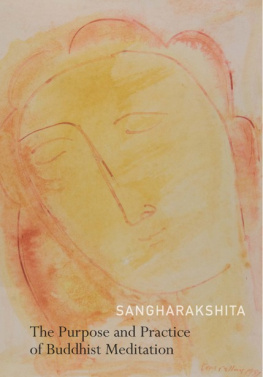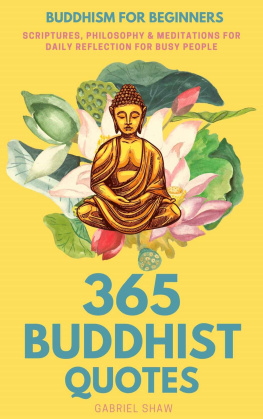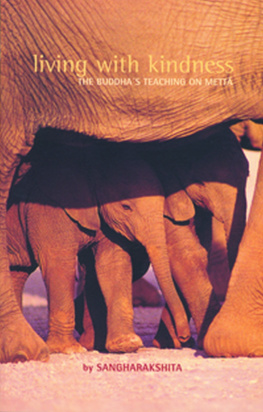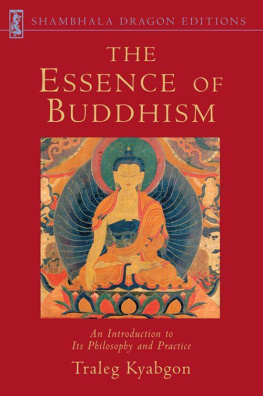Fifth Talk
Seeing into one's own nature and realizing Buddhahood.
Today we come to the fourth and last line of the traditional verse with the help of which we have been trying, during the past few weeks, to gain some insight into the essence of Zen. The line reads, Seeing into ones own nature and realizing Buddhahood. The expression ones own nature corresponds to the Sanskrit svabhava , literally own-being or self-nature, and in this context stands for the mind on which the previous line asked us to depend. One could, therefore, also render the line as Seeing into ones own mind and realizing Buddhahood. The word and, however, does not appear in the original Chinese. Indeed, I believe the Chinese language dispenses altogether with conjunctions. What one has not divided one is under no necessity of joining together again. Here the omission, as we would regard it, of the word and suggests that seeing into ones own nature or into ones own mind and realizing Buddhahood are not two distinct, even if parallel, activities, but simply different aspects of one and the same spiritual process.
In order to understand how this process takes place let us refer to the Surangama-samadhi Sutra , one of the most distinguished of the great Mahayana scriptures. The scene of the Sutra is laid at Shravasti, in North-Western India, in the orchard which Anathapindika, the rich merchant, had acquired from Prince Jeta as a retreat for the Buddha. Soon after the Sutra begins the Buddha and His disciples are all invited to a great feast by the king, it being the anniversary of his fathers death. At the appropriate time all therefore depart for the palace. Only Ananda, the Buddhas personal attendant, is missing. He has gone out on an errand, and returns only after the others have left. Finding the monastery deserted, and nothing to eat, he takes his almsbowl and goes begging from door to door in the streets of the city. Being a conscientious monk, he begs from all alike, without discriminating between rich and poor, or between high-caste and low-caste, and in this way eventually comes to the house of a low-caste woman called Matangi who has a beautiful daughter called Prakriti. As soon as she sees the young and handsome monk Prakriti falls violently in love with him, and begs her mother to cast a love-spell upon him. This Matangi does. Ananda, though a conscientious monk, is not proof against the assaults of magic, and not only becomes fascinated by the maidens charms but is lured into the house and into her room.
Meanwhile, the Buddha has returned to His orchard retreat, where He discourses to the king and other notabilities, who have accompanied Him back from the palace. Knowing all the time what was happening to Ananda, however, he calls the Bodhisattva Manjushri, the embodiment of Wisdom, and bids him go and save Ananda by repeating the Great Dharani at Matangis house. As soon as Manjushri does this, Matangis spell loses its power, Ananda comes to his senses, and the crestfallen monk and repentant maiden accompany the great Bodhisattva back to the feet of the Buddha.
Now all this obviously has an allegorical meaning. To begin with, Matangi is a low-caste woman. She occupies a place, that is to say, at the very bottom of the Indian social system. Since there exists a clear correspondence between the higher and lower castes, on the one hand, and higher and lower states of consciousness, on the other, she may be said to represent the unrecognized or repressed side of ones nature. In Tantric Buddhism, indeed, the low-caste woman is the regular symbol for all the crude, unsublimated psychic energies which, according to this tradition, should not be repressed but brought out into the open and united with ones conscious spiritual attitude. It is also significant that Matangis daughter is called Prakriti, for Prakriti means Nature. Ananda is very learned and very conscientious but he is not enlightened. He has not succeeded, that is to say, in integrating the different sides of his own being. Head is still at war with heart, conscious with unconscious. The casting of the spell represents not an assault from without, but rather an attack coming from forces deep within his own unconscious mind, forces with which he has not yet come to terms. Manjushri, of course, represents Transcendental Wisdom. The conflict between head and heart, reason and emotion, conscious and unconscious mind, can be resolved only by the emergence of a higher faculty, wherein the light of reason and the warmth of emotion are not only fused but raised to the highest possible degree of intensity. Only when the Bodhisattva recites the Great Dharani does Matangis spell lose its power. But this does not mean that the natural forces which the spell represents are simply thrust back into the darkness of the unconscious. Manjushri is no St. Michael triumphantly holding down the powers of evil. Manjushri brings Ananda back to the feet of the Buddha. But he brings Prakriti too. In other words, Nature is not to be repressed but recognized, not to be rejected but purified and assimilated.
On coming into the Buddhas presence Ananda prostrates himself before Him, confesses his shortcomings, and asks for help. The Buddha says that He will question Ananda, and that the latter should answer spontaneously , without recourse to discriminative thinking. The qualification is important. Ananda is a very learned man, he has heard much, but the Buddha does not want him to answer out of his acquired knowledge, which is after all second-hand, but out of himself, out of his personal perception and realization. He wants him to speak with his own voice, not with a borrowed voice. This sort of spontaneity is, of course, very rare. Usually, when questioned on matters of fundamental concern, we reply after much thought and deliberation. That is to say, we reply from a comparatively superficial level of our being, from one made up of accretions from without rather than creations from within, from opinion and hearsay. Only in moments of crisis, or when deeply moved, do we in a sense really speak out. It is this sort of spontaneity, only coming from even deeper, coming from the existential depth of the disciple, that the Zen mondo or exchange between master and disciple, or between one master and another, is designed to elicit. So long as the disciple speaks from anything less than his own true mind, or Buddha-nature, the master remains unsatisfied.
Step by step, relentlessly, the disciple is therefore forced into a corner, into an impasse. All his answers rejected, his mind baffled, his intellectual resources exhausted, in a state of near collapse, he can escape from the impasse only by waking up to the reality of his own true mind, and speaking out from that, saying whatever comes. Perhaps, indeed, what comes will not be words at all, but a laugh or a smile, a polite bow or a sudden blow. But it must be spontaneous, and it must come from the deepest possible level of his being.
It is in this manner that the Buddha wants Ananda to answer his question, and the question is, How did you become interested in Buddhism?* In other words the Buddha recurs to fundamentals. He does not waste time asking Ananda why he was late getting back from his errand, or why he had not kept his eyes firmly fixed on his almsbowl while begging for food at Matangis house. Instead, like a thunderbolt out of a clear sky comes the question, How did you become interested in Buddhism? As the import of the Sutra is universal and timeless, the question is addressed not only to Ananda but to us, not only to the Ananda on the stage of Buddhist history but to the Ananda in our own minds, to that aspect of ourselves which, being unintegrated, is liable, as he was liable, to the attacks of the unconscious. We too need, periodically, to explore the nature of our own commitment, to examine our reasons for following the Path to Enlightenment. Are we attracted to Buddhism by its art, or its ethics, or its metaphysics? Was it books that brought us to the feet of the Buddha or the living example of someone we know? Are we in search of psychological security? Has our Buddhist life become a matter of habit and routine? These are the sort of questions we should ask ourselves, and like Ananda we should try to answer them spontaneously.






